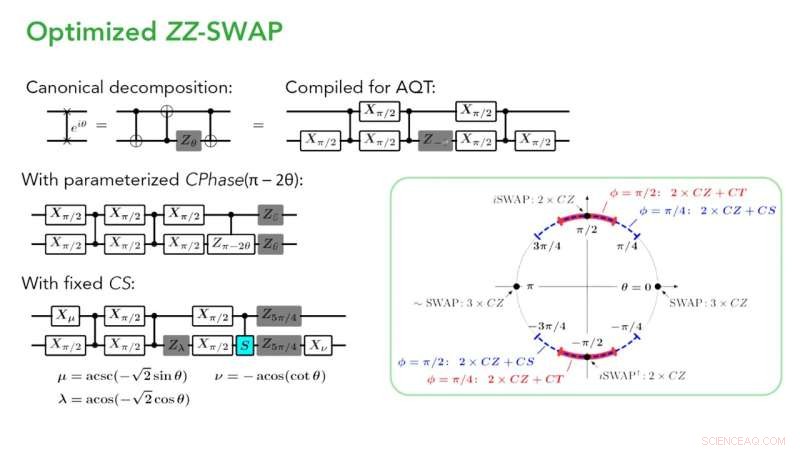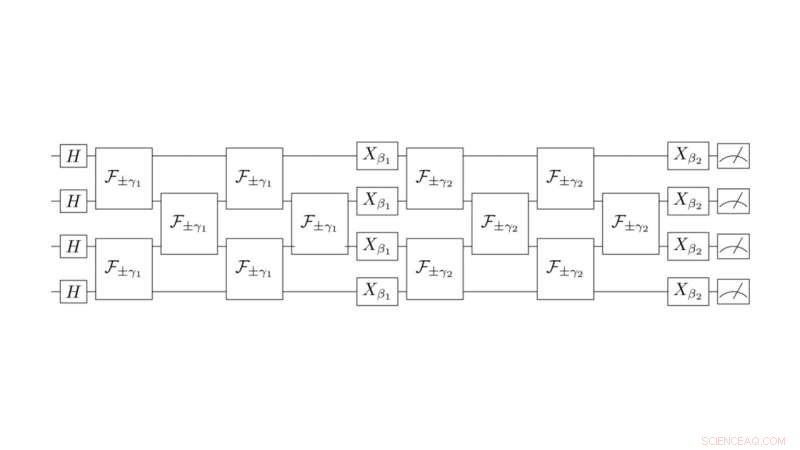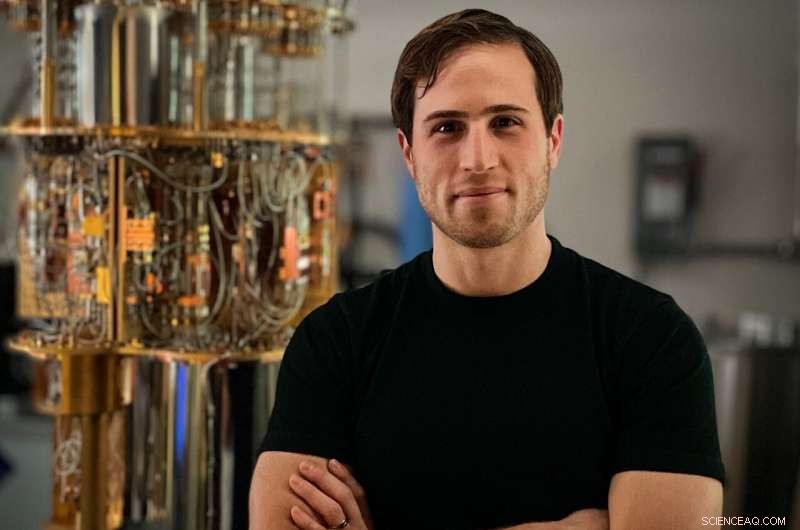
Esquema completo de redes SWAP optimizadas por software para las puertas de AQT. Crédito:Rich Rines/Super.tech
Una asociación de investigación en Advanced Quantum Testbed (AQT) en el Laboratorio Nacional Lawrence Berkeley (Berkeley Lab) y Super.tech con sede en Chicago (adquirida por ColdQuanta en mayo de 2022) demostró cómo optimizar la ejecución del protocolo de red ZZ SWAP, importante para computación cuántica. El equipo también presentó una nueva técnica para la mitigación de errores cuánticos que mejorará la implementación del protocolo de red en los procesadores cuánticos. Los datos experimentales se publicaron este julio en Physical Review Research , agregando más caminos en el corto plazo para implementar algoritmos cuánticos utilizando computación cuántica basada en puertas.
Un compilador inteligente para hardware cuántico superconductor
Los procesadores cuánticos con arquitecturas bidimensionales o tridimensionales tienen una conectividad de qubits limitada en la que cada qubit interactúa solo con un número limitado de otros qubits. Además, la información de cada qubit solo puede existir durante tanto tiempo antes de que el ruido y los errores causen decoherencia, lo que limita el tiempo de ejecución y la fidelidad de los algoritmos cuánticos. Por lo tanto, al diseñar y ejecutar un circuito cuántico, los investigadores deben optimizar la traducción del circuito formado por puertas abstractas (lógicas) a instrucciones físicas basadas en las puertas de hardware nativas disponibles en un procesador cuántico determinado. Las descomposiciones de circuitos eficientes minimizan el tiempo de operación porque consideran la cantidad de puertas y operaciones admitidas de forma nativa por el hardware para realizar las operaciones lógicas deseadas.
Las puertas SWAP, que intercambian información entre qubits, a menudo se introducen en los circuitos cuánticos para facilitar las interacciones entre la información en qubits no adyacentes. Si un dispositivo cuántico solo permite puertas entre qubits adyacentes, los intercambios se utilizan para mover información de un qubit a otro qubit no adyacente.
En hardware ruidoso cuántico de escala intermedia (NISQ), la introducción de puertas de intercambio puede requerir una gran sobrecarga experimental. La puerta de intercambio a menudo debe descomponerse en puertas nativas, como las puertas NO controladas. Por lo tanto, al diseñar circuitos cuánticos con conectividad qubit limitada, es importante utilizar un compilador inteligente que pueda buscar, descomponer y cancelar puertas cuánticas redundantes para mejorar el tiempo de ejecución de una aplicación o algoritmo cuántico.

Esquema de redes SWAP para QAOA en cuatro qubits. Crédito:Akel Hashim/Berkeley Lab
La asociación de investigación utilizó el software SuperstaQ de Super.tech, lo que permitió a los científicos adaptar con precisión sus aplicaciones y automatizar las compilaciones de circuitos para el hardware superconductor de AQT, en particular para una puerta S nativa de alta fidelidad controlada, que no está disponible en la mayoría de los sistemas de hardware. Este enfoque de compilación inteligente con cuatro transmon qubits permite que las redes SWAP se descompongan de manera más eficiente que los métodos de descomposición estándar.
A network of ZZ SWAP gates requires only minimal linear connectivity between qubits without additional couplings, so it offers practical advantages for the efficient execution of quantum algorithms such as the Quantum Approximate Optimization Algorithm (QAOA). QAOA approximates solutions to combinatorial optimization problems—finding the optimal answer by giving a set of criteria. The Maximum-Cut problem, which can be used to arrange hubs on a transport grid system, is an example of a famous combinatorial optimization problem that can be potentially solved faster with QAOA using quantum circuits.
"One of the toughest challenges in quantum computing is to perform discrete logic operations. Because our control signals are analog and continuous, they're always imperfect. As we build more complex quantum circuits, the software infrastructure that optimally compiles gates tailored for AQT's hardware helps us achieve higher operational fidelity," Akel Hashim, the lead AQT researcher on the experiment and a graduate student at the University of California, Berkeley.
"A unique feature of quantum computing is that it enables partial logic gates. This feature has no parallel in traditional boolean logic—for example, your laptop computer can't execute 50% of an AND gate. AQT's ability to calibrate these partial controlled-S quantum gates opened the door for us to develop a wider array of novel optimizations to squeeze the most out of the hardware," said Rich Rines, formerly of Super.tech and currently a software engineer at ColdQuanta.
"A key software engineering challenge for this experiment was collaborating remotely, so we iteratively developed quantum circuit optimizations informed by the custom gates AQT's team calibrated. We optimized end-to-end by figuring out how to serialize these pulses while considering the hardware. We also figured out how to integrate open-source quantum software packages with our compiler, ensuring that our optimizations don't re-invent the wheel," said Victory Omole, formerly at Super.tech and software engineer at ColdQuanta.

Akel Hashim, lead AQT researcher on the experiment. Credit:Akel Hashim/Berkeley Lab
As part of the experiment, the team also introduced a novel technique called Equivalent Circuit Averaging (ECA), which randomized the various parameters of the SWAP networks to generate many logically equivalent circuits. ECA randomizes the decomposition of quantum circuits, mitigating the impact of systematic coherent errors—one of the most severe errors in quantum computers and error mitigation at AQT.
"I proposed a way to merge my previous experimental work in randomized compiling with Quantum Benchmark (acquired by Keysight) using Super.tech's smart compiler to study a new way to reduce the impact of crosstalk errors," said Hashim. "I would not have had the insight to come up with this idea had I not worked with other researchers as part of AQT's user program. As someone who's going to enter the workforce, networking is critical to building a core base of people I know in the field who are experts in various areas, to whom I can pitch research ideas as well."
These experimental optimizations resulted in an improvement of up to 88% in the performance accuracy of QAOA. Researchers are looking to continue to explore and refine the methods in this work and apply them to other applications.
Supporting industry growth with an open-access research lab
AQT operates a state-of-the-art open experimental testbed based on superconducting circuits and is funded by the United States Department of Energy Office of Science Advanced Scientific Computing Research (ASCR) program. Technologies developed elsewhere can be deployed and field-tested at AQT, providing deep access to the full quantum computing stack at no additional cost.
Since the inauguration of its user program in 2020, AQT provided Super.tech, one of several industry users, with low-level access to the hardware to test their ideas. Few cloud-based quantum platforms offer this type of full access to the entire quantum computing stack and real-time feedback from the hardware experts at no cost. Super.tech collaborated with AQT's expert experimental team to learn ways to improve performance on this type of hardware.
"By revealing the inner controls of quantum hardware, AQT's collaborative approach with users drives innovation throughout the quantum computing stack. We look forward to continuing our research collaboration with AQT, and we will continue to share these results with the scientific community by publishing our learnings," said Pranav Gokhale, VP of Quantum Software at ColdQuanta and Super.tech former CEO and co-founder.
AQT at Berkeley Lab continues to grow as a cutting-edge hub for quantum information research and development by bringing together expertise and users, including early-stage startups, such as Super.tech, who now continue in their growth journey as part of ColdQuanta. Breakthrough in quantum universal gate sets:A high-fidelity iToffoli gate